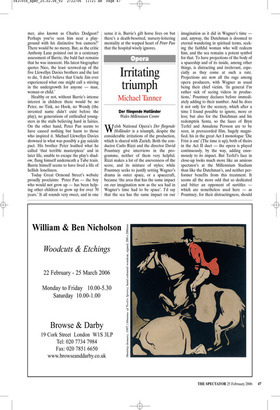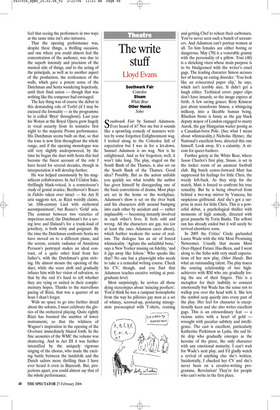Irritating triumph
Michael Tanner
Der fliegende Holländer Wales Millennium Centre
Welsh National Opera’s Der fliegende Holländer is a triumph, despite the considerable irritations of the production, which is shared with Zurich. Both the conductor Carlo Rizzi and the director David Pountney give interviews in the programme, neither of them very helpful. Rizzi makes a lot of the unevenness of the score, and its mixture of styles; while Pountney seeks to justify setting Wagner’s drama in outer space, or a spacecraft, because ‘the area that has the same impact on our imagination now as the sea had in Wagner’s time had to be space’. I’d say that the sea has the same impact on our imagination as it did in Wagner’s time and, anyway, the Dutchman is doomed to eternal wandering in spiritual terms, seeking the faithful woman who will redeem him, and the sea remains a potent symbol for that. To have projections of the body of a spaceship and of its inside, among other things, is distracting and irrelevant, especially as they come at such a rate. Projections are now all the rage among opera producers, with Wagner as usual being their chief victim. ‘In general I’m rather sick of seeing videos in productions,’ Pountney declares before immediately adding to their number. And he does it not only for the scenery, which after a time I found possible to ignore, more or less; but also for the Dutchman and his redemptrix Senta, so the faces of Bryn Terfel and Annalena Persson are to be seen, in prerecorded film, hugely magnified, his in the great Act I monologue ‘Die Frist is um’ (The time is up), both of theirs in the Act II duet — the opera is played continuously, by the way, adding enormously to its impact. But Terfel’s face in close-up looks much more like an anxious spectator’s at the Millennium Stadium than like the Dutchman’s, and neither performer benefits from this treatment. It seems all the more odd that so dedicated and bitter an opponent of surtitles which are nonetheless used here — as Pountney, for their distractingness, should feel that seeing the performers in two ways at the same time isn’t also intrusive.
That the opening performance was, despite these things, a thrilling occasion, and one where you could almost feel the concentration of the audience, was due to the superb intensity and precision of the musical side of things, and to the acting of the principals, as well as to another aspect of the production, the restlessness of the walls, which gave a potent sense of the Dutchman and Senta wandering hopelessly, until their final union — though that was nothing like the composer had envisaged.
The key thing was of course the debut in this demanding role of Terfel (if I may be excused the formality — in the programme he is called ‘Bryn’ throughout). Last year his Wotan at the Royal Opera grew hugely in vocal security from its tentative first night to the majestic Proms performance. His Dutchman seems built on that, so that the tone is now firm throughout the whole range, and if the opening monologue was still very slightly underpowered, by the time he began the duet with Senta this had become the finest account of the role I have heard for several decades, though in interpretation it will develop further.
He was helped enormously by his magnificent collaborators. In Act I Gidon Saks, thrillingly black-voiced, is a connoisseur’s study of genial avarice, Beethoven’s Rocco in Fidelio taken over intact — his Act II aria suggests not, as Rizzi weirdly claims, ‘an 18th-century Lied with orchestral accompaniment’, but Rocco’s ‘Gold’ aria. The contrast between two varieties of imperious need, the Dutchman’s for a saving love and Daland’s for a trunk-load of jewellery, is both witty and poignant. By the time the Dutchman confronts Senta we have moved on to a different plane, and the serene, ecstatic radiance of Annalena Persson’s portrayal makes an ideal contrast, of a quite other kind from her father’s, with the Dutchman’s grim striving. He almost moans the opening of the duet, while she soars aloft and gradually infuses him with her vision of salvation, so that by the end it’s hard to tell whether they are vying or united in their complementary hopes. Thanks to the marvellous pacing of Rizzi, that was a quarter of an hour I shan’t forget.
With no space to go into further detail about the soloists, I must celebrate the glories of the orchestral playing. Quite rightly Rizzi has boosted the number of lower instruments, so that the wildness of Wagner’s inspiration in the opening of the Overture immediately blazed forth. In the fine acoustics of the WMC the volume was shattering. And in Act III it was further intensified by the uniquely vigorous singing of the chorus, who made the exciting battle between the landsfolk and the Dutch sailors more thrilling than I have ever heard it even in Bayreuth. But, projections apart, you could almost say that of the whole performance.



































































 Previous page
Previous page